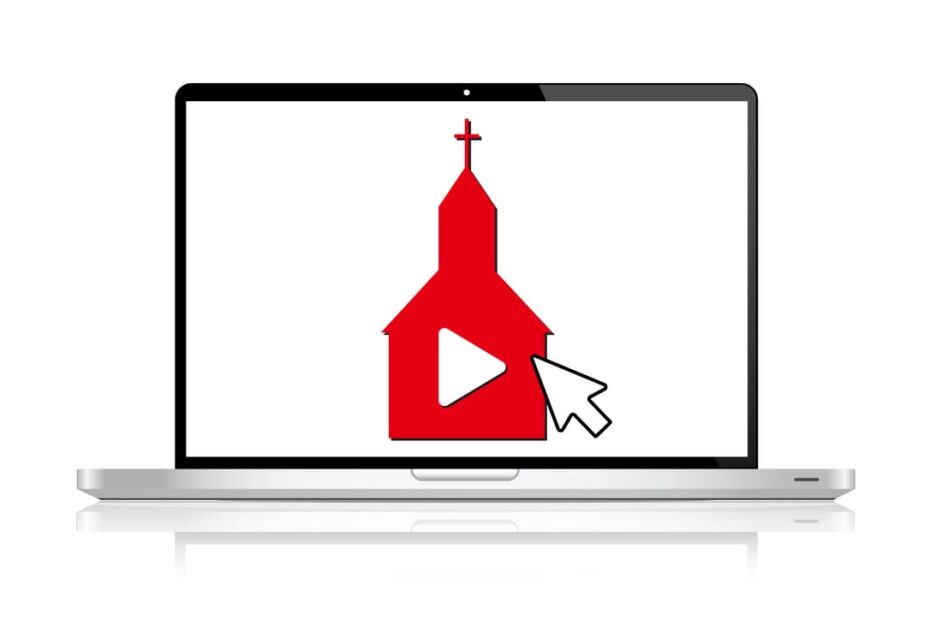Your church website has two main audiences. It’s clearly one of the most important tools you have in your toolbox to communicate with church members. Most of us have grown accustomed to getting information about any organization we’re a part of through the web.
But your website is far more important as a way to communicate with your guests. Your guests don’t get weekly announcements. Most of them aren’t on your email lists.
Before your guests pass through your doors, they’ll visit your website. Nearly every decision we make these days begins online—from buying a dishwasher to applying for a new job. Visiting a church is a prime example. Even as far back as 2012, 46 percent of people said that a church website was important in helping them choose a church. That number has likely climbed much higher in recent years, particularly after 2020.
To engage those guests, your church doesn’t need a flashy site. You do need a helpful one though, so guests can get the information they need before visiting.
You also need a website that guests can find. Search engine optimization (SEO) can seem overly technical and confusing to those who aren’t knee-deep in that world, but it’s really not difficult.
A good SEO strategy for a church website is also a good guest strategy. SEO in 2024 isn’t about creating a website for computers. It’s about creating a website for people. The more helpful you are to your visitors, the better content you provide, and the more likely your website will be found through the latest search engines. That’s why it’s critical that your website does both–helps guests and can be found through good SEO tactics.
Here are a few ideas to get you started.
1) Develop a User-Friendly Navigation
When you’re designing your website, the ability to navigate must be your priority. Think about your guests first and foremost. Your guests don’t know your internal language. Many of your long-term members likely don’t remember the intricacies of your church’s mission statement and strategic plan. Your guests will be lost if you organize your site through those principles.
Ask yourself what a guest needs to know if they plan a visit to your church. Make it simple to find those locations on your website. If you have any doubts (or even if you don’t), ask a few people unfamiliar with your church to review the site. Ask them if they can answer all the pertinent questions about visiting your church in just a few minutes.
2) Use Natural Language
Web writing is conversational. Your website must read like people talk if you want to engage guests. As mentioned earlier, cut out your church’s organizational jargon. But don’t stop there. Limit your Christian jargon as well.
Even on a page like your church’s doctrinal statement, do your best to make it understandable to people with a limited theological background. Don’t be afraid to create two distinct pages for sharing your doctrinal commitments– one that leverages precise theological language (because theology is one place where precision matters) and one that communicates what your church believes in the language most people use in everyday life.
3) Simplify. Simplify. Simplify.
As an insider in a church, you likely have an exaggerated understanding of what needs to be on your website. Guests likely don’t have the same interests as you have. Fight the urge to make every bit of information about your church available for guests to peruse on your website. If you need to create a separate guest experience to do this well, do it. Don’t confuse guests. Give them the information they need to make a good decision about whether they’ll visit.
4) Post Quality Content
Give people a reason to visit your site. Content (or what your church says on its website) is the heartbeat of your site. It includes everything from sermons to articles to event information to doctrinal descriptions. Everything on your site should be done as high quality as possible.
Good content ensures that people will want to visit your site. Every time someone visits, search engines get the idea that your site has value, and you’ll get bumped up accordingly. Nearly every important element of your church’s search engine rankings revolves around the quality of your website content. Other websites link to good content. It’s shared online. It increases the time people spend on your site. When you do all of that, your site will be easier to find on search engines.
5) Ensure Fast Load Times
A slow website will frustrate your website visitors and negatively impact search engine rankings. You can make some easy fixes to your site to make sure your site loads quickly. Maybe the easiest way to better your load time is to optimize your images by using compressed formats like JPEGS or WebP (and using the actual sizes that you’re displaying the images in, not just using your HTML or CSS to do it for you).
Ideally, try to get your load time under a second (or at least under two).
6) Optimize for Mobile Users
You know the drill here. Most people are accessing the web on mobile devices these days. You don’t want them calling up the desktop version of your site on their smart device. It’s a bad experience. Plus, Google and other search engines will penalize you in search rankings if your site isn’t mobile-optimized. The good news is that it’s relatively easy to do this through whatever content management system your church uses.
7) Invest in Local SEO
Your church’s website doesn’t need to rank well in searches two time zones away. You want to show up in search results for your local area. One of the most important places to start is by leveraging Google Business, a free tool that allows you to provide a short description of your church, a link to your website, service times, location, etc., on Google Search and Maps.
Focus on finding and incorporating local keywords in your content, titles, and meta description. Include your site in as many local online directories as possible. Keep the information in these places consistent (and updated) across all the platforms.
Look for ways to encourage guests to give you reviews on Google and other review sites. These reviews help raise your profile in local searches.
8) Encourage Social Sharing
Social media sharing has two main benefits for your church. First, it’ll help your church get the word out about what’s going on. Most people you want to reach are on social media. Social media helps the most when it reaches beyond the bounds of your congregation through sharing.
Encouraging social sharing also increases website traffic and likely the number of backlinks you get, which will help your search engine rankings.
9) Update Your Content Regularly
The more often you update your content, the more likely you are to engage more people through your site. When people consistently visit your site and find stale content, they eventually don’t return (particularly when it’s obvious it has old dates). When guests discover outdated information on your site, they assume your church isn’t paying attention.
Google’s search engine algorithm will also penalize your site for not updating your content in a regular manner.
In today’s digital world, your church’s website is the front door to your ministry. It’s often the initial point of contact for guests to engage with your congregation. You don’t need to sacrifice your church’s local search engine ranking when you optimize your site for guests. SEO today isn’t about appeasing algorithms. It’s about serving people.
Serve your guests well, and you’ll make it easier for people to find you through search engines.
ACS Technologies
ACS Technologies sets a new standard in church technology, offering a holistic suite of solutions that streamline administrative tasks and empower your staff to excel in their roles and your church to excel in your community.
In the ever-evolving landscape of church engagement and management, ACS Technologies rises above the rest. Our comprehensive church solutions, bespoke digital offerings, streamlined communication tools, comprehensive ministry consulting, and training make us the trusted choice for over fifty thousand churches. Experience the ACS Technologies advantage and elevate your church’s online presence, connectivity, and generosity today. Join us in redefining church technology for the digital age, where your ministry’s success becomes our shared mission.




